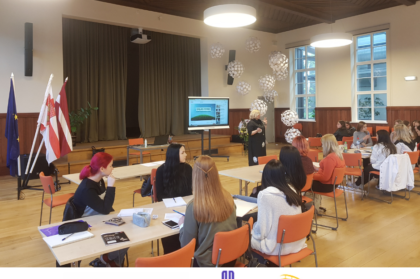Projects main output was to involve 100 adults in joint local employment initiatives and joint training. 60 students had to be trained in Ventspils Vocational College (LP) and 40 in Panevezys Centre of Vocational Education (PP2). Also at least 8 teachers/lectures had to be prepared to deliver the lectures. Vocational programme which was implemented into both project partner education institutions had to be developed and implemented based on internationally recognised standards and using best global practices.
Improvement of teachers’ competencies
BTEC “Work skills” programme that was introduced in both partner education institutions consisted of 6 modules, each modules lenght – 30h. Both partners were able to choose how to develop their own programme depending on their expert suggestions and regional economical needs but the practices and basic principles (evidence registration, the % of theory and practice) had to be the same. To reach common understanding of how to develop and implement the programme Pearson staff (BTEC experts) flew to Latvia during the summer of 2019 for 2 two day trainings to train LP and PP2 teachers and administration. Certificates were issued to all 22 attendees that will be able to use this knowledge and methodolical tools not only in this projects’ framework but also in their day-to-day work in other programs and subjects that will give project result longlife.
Enhancement of employability and labour mobility
The BTEC Work Skills program was developed using best global practices. The Work Skills program includes the development of competencies related to skills such as self-assessment, teamwork, leadership skills, self-presentation and communication skills, critical thinking, work-related problem solving, project management skills and business start-up skills that will allow our students to be more skilled and in demand in both the local and European labor markets. The program was piloted in September 2020 in Latvia (Ventspils) and and in February 2021 in Lithuania (Panevėžys). In total 100 students conducted training in this program, increased their competenes and obtained certificates that are recognised in more than 70 countries around the world.
Strengthening the material and technical base in the field of digital technologies
To ensure Work skills programme implementation project partners each bought equipment (20 tablets) that was used for education purposes and distances learning while Covid-19 restrictions did not allow face-to-face studies. This have also complemented institution’s material and technical equipment base and will allow students to learn with more modern technologies.
Methodological materials and manuals
Programme partners developed several handbooks and materials that were based on BTEC standards but adjusted to Work skills program that was implemented in each institution. Some of these handbooks are very specific and aimed for particual education institution but one of them “BTEC Centre handbook” can be used as information source for other interested groups who would like to develop and implement similar program in their institutions.
BTEC Centre handbook (ENG)
BTEC Centre handbook (LV)
Project reach
During project implementation project partners used their own social media platforms and web pages to inform general audiences and also target groups about the program and project aims, project progress and results. Two weeks before the end of the project an international conference was organized and gathered around 70 participants from various European countries to hand-over experience to other education institutions, to inform stakeholders about achieved results and just to celebrate successful project implementation.
International conference video: https://www.ventspilstehnikums.lv/projekta-lli-415-konferences-video-ieraksts/




